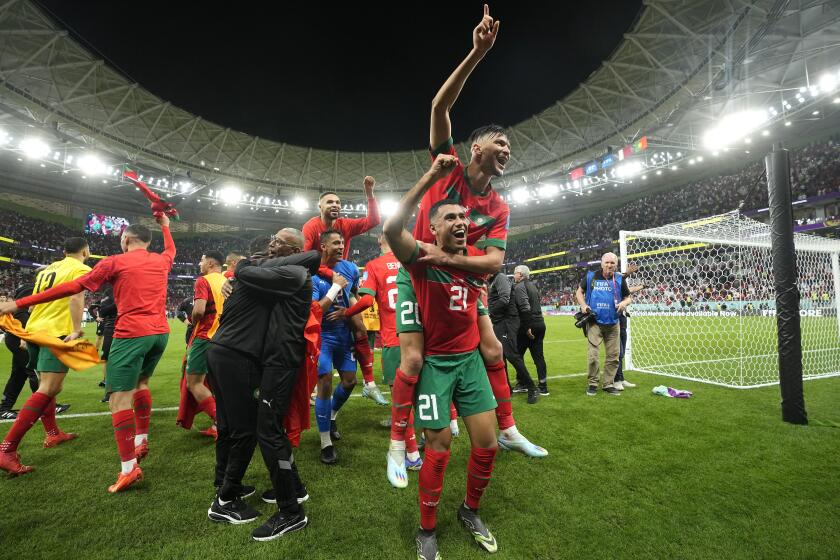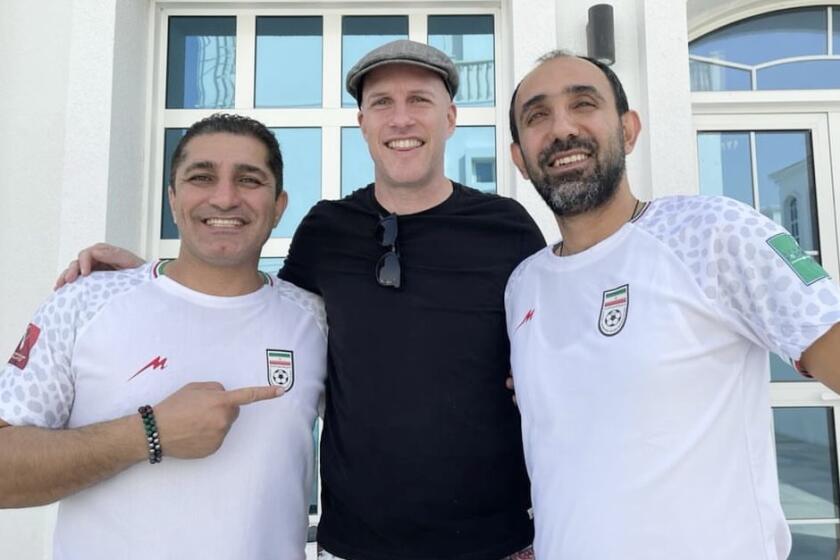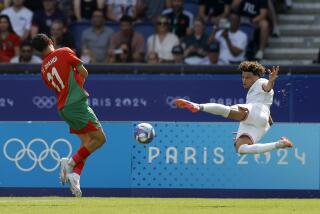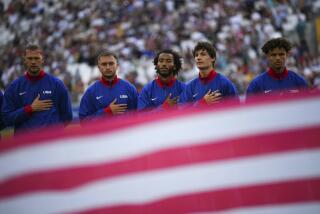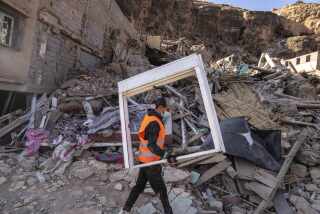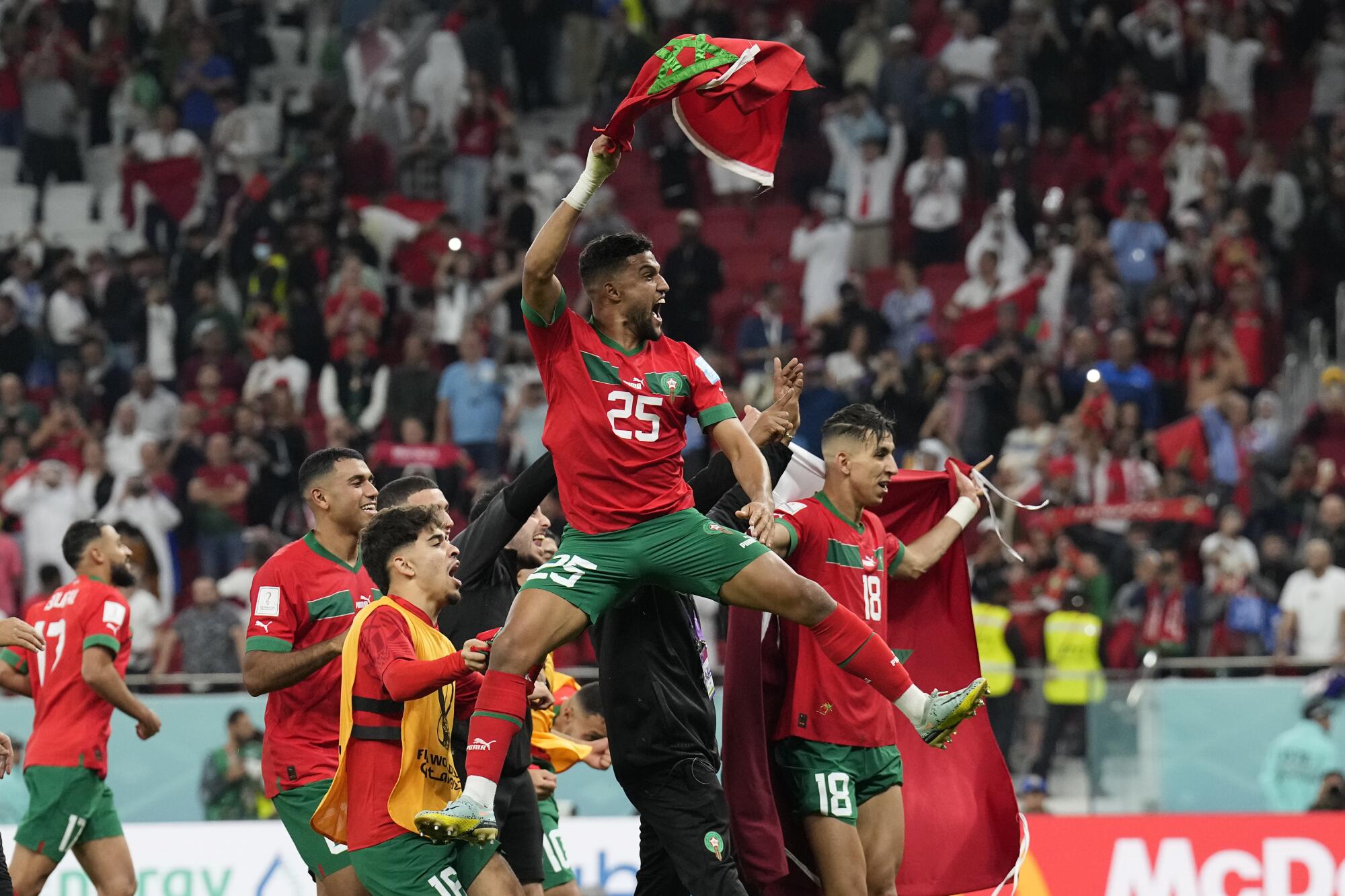
- Share via
DOHA, Qatar — The Corniche, the 4½-mile waterfront promenade that wraps around Doha Bay, has become a gathering spot for fans at Qatar’s World Cup. When the tournament started three weeks ago, the canary yellow of Brazil, iconic green of Mexico, and blue and white stripes of Argentina were everywhere.
With just four teams left, the main color you see now is the tomato red of Morocco.
In the first World Cup held in the Middle East and the first played in a majority-Muslim country, Morocco has made history by becoming the first African and first Arabic-speaking nation to reach the semifinals. And that has made it an inspiration heading into Wednesday’s game against France, Morocco’s onetime colonial ruler.
“All Arabs are supporting them,” Nizar Ahmad, a 27-year-old nurse from Jordan, said as he and a friend walked the bayfront on a comparatively chilly desert night. “We have an Arab country as one of the best in the world.”
The fact that Morocco straddles those worlds adds to the appeal. Geographically, Morocco is a North African country — one that FIFA, the global governing body for soccer, has put in the 54-member Confederation of African Football. But culturally and linguistically, it is part of the Arab world.
The 2022 World Cup semifinals include countries and familiar faces that have a chance to make history. But could this all be thanks to stray cats?
The team has adopted both identities.
“I am not here to be a politician. We want to fly Africa’s flag high just like Senegal, Ghana and Cameroon,” said Morocco’s Paris-born coach, Walid Regragui. “We are here to represent Africa.”
Meanwhile, winger Sofiane Boufal, who was born in France and still plays club soccer there, dedicated a recent victory “to all Arab people and to all Muslim people.”
The split dates back nearly two centuries to when Arabic speakers across the Middle East and North Africa began identifying with a single Arab culture based primarily on language. That affinity is why people from all 22 countries of the Arab world, from Oman in the east to Algeria in the west, have put aside their political differences when it comes to cheering for Morocco.
“We are the Rocky of this World Cup. When you watch ‘Rocky’ you want to support Rocky Balboa. Now the world is with Morocco.”
— Morocco’ coach Walid Regragui
“Morocco’s success in the World Cup is seen as a success for all Arab nations as well as North African nations,” said Mounah Abdel-Samad, a professor at San Diego State who has written on the politics and culture of the Arab world. “Many U.S. viewers may think of the Middle East in terms of the oil-rich Gulf nations, but ... Morocco’s success allows Arab and North African countries a reprise from the daily economic and social challenges and provides them with hope and pride that people like them can succeed at the international level and on the world stage.”
Just hours after Morocco’s 1-0 quarterfinal win over Cristiano Ronaldo and Portugal on Saturday, the phenomenal leap that allowed Youssef En-Nesyri to head in game’s only goal had become a metaphor for the kind of Arab ambition Morocco’s success represents.
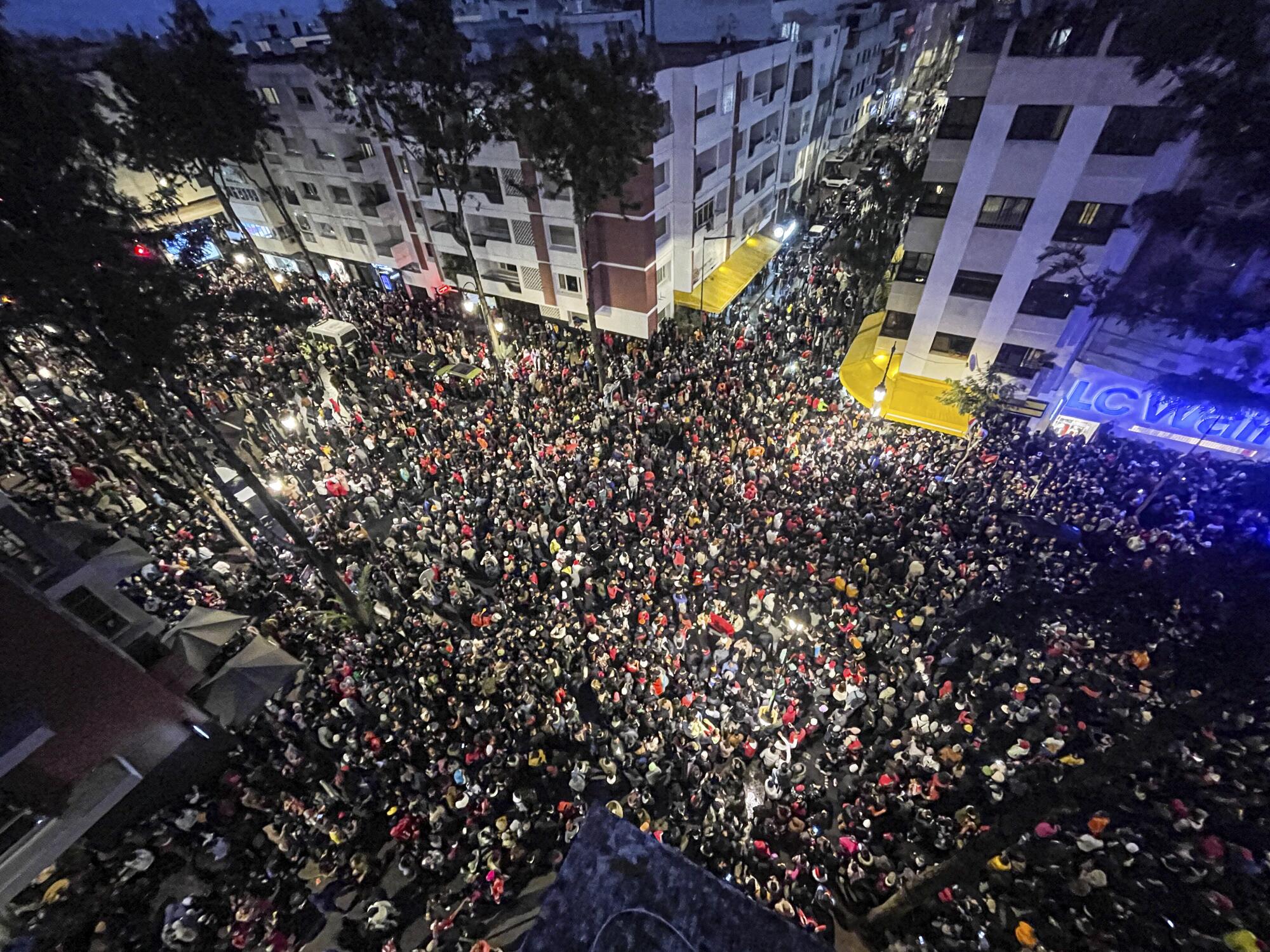
“The Arabs proved they’re able to jump and fly and soar, not just in sports but in all aspects of life, if they have the will and determination,” Jordanian commentator Ziad Nabulsi wrote on Facebook. “Congratulations to Morocco and all the Arabs, and I say that winning the World Cup itself is not impossible.”
People celebrated the victory Saturday by pouring into the streets of Amman, Cairo, Casablanca, Tunis, Kuwait City, Gaza City and cities across the West Bank to celebrate. Even Palestinian Israelis in Jerusalem raised the Moroccan flag in a collective joy that seems to have energized a Pan-Arab spirit many have said is all but dead.
In fact, among the most visible banners at World Cup matches has been the Palestinian black, white, green and red flag.
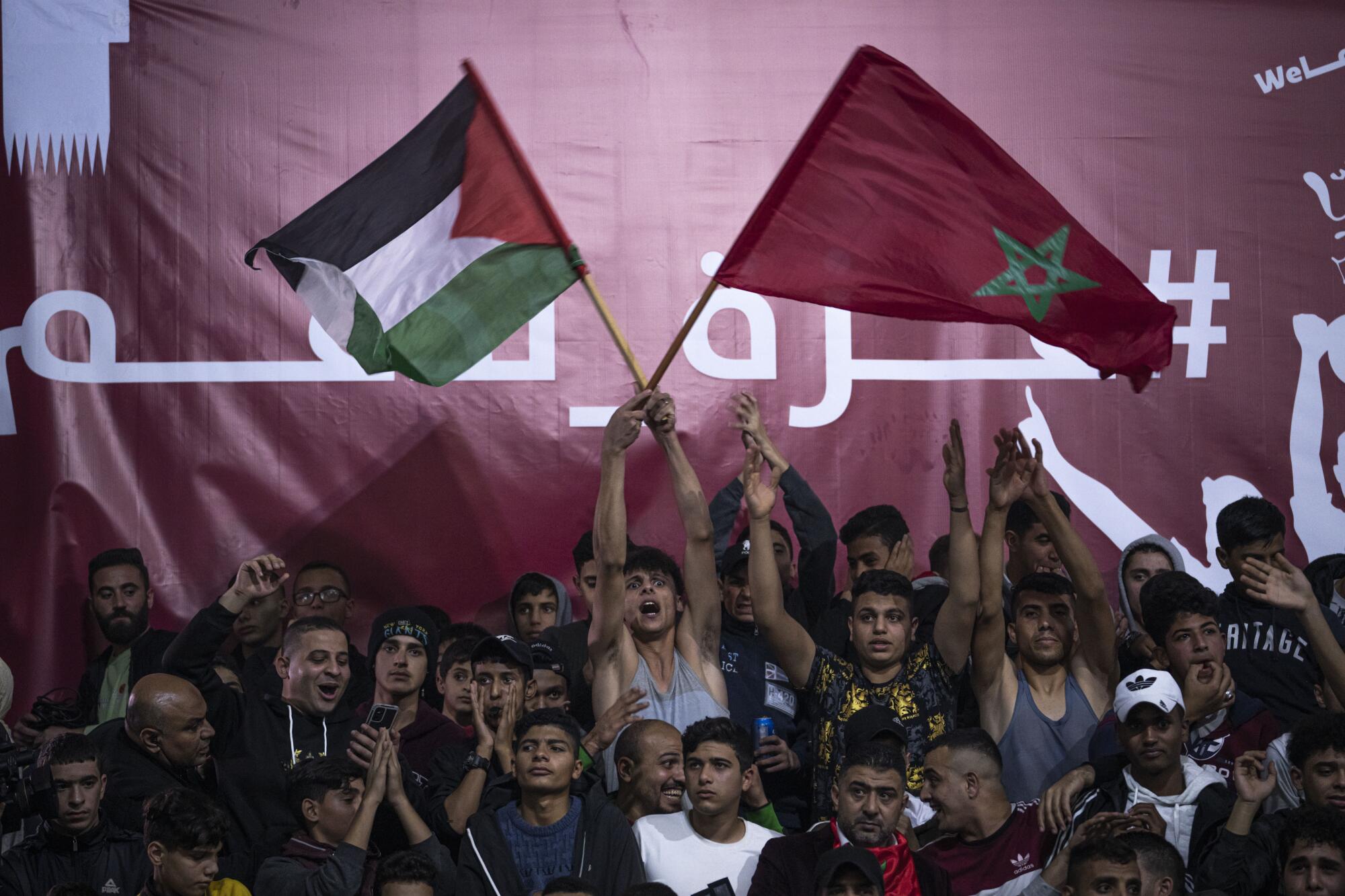
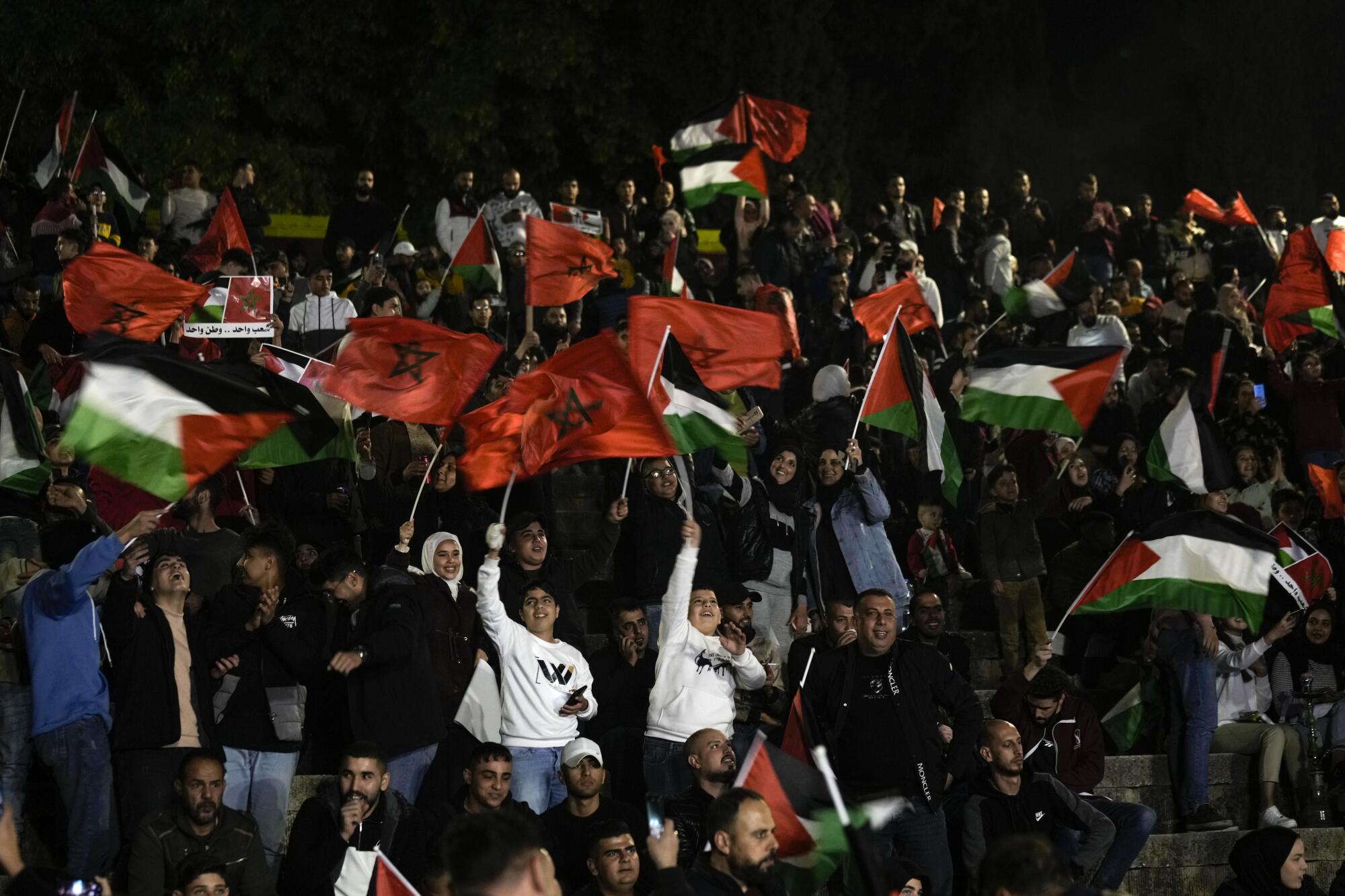
“Getting to the semifinals gives not only Moroccans but Arabs everywhere a chance to be proud of their culture and their region,” said Jessica Marglin, a professor of religion, law and history at USC. “Historically, Arabs across the region have expressed solidarity with Palestinians. So supporting Morocco is also a chance for Arabs to express common ground with one another in support of Palestinians.”
The desire to strike back at the onetime colonial powers that governed parts of Africa and the Middle East has also played a significant role in fueling Morocco’s World Cup appeal.
Three of the countries Morocco has beaten here — Belgium, Spain and Portugal — were, for centuries, harsh rulers across much of the region. Next up is France, which took Morocco by force in the early 20th century and didn’t give its people back their independence until 1956.
“The colonial dimension could not be more important,” Marglin said. “France’s colonial legacy casts a long shadow over both countries, so this match definitely holds a symbolism beyond just wanting to advance to the finals. It will be emotional, especially for those Moroccans living in France — many of whom have not only dual citizenship but a sense of dual identity.”
“Morocco deserves everyone’s recognition. When you face the teams they have met, had their results and conceded only one goal in five games, you can no longer say that it’s a surprise.”
— France coach Didier Deschamps
That dual identity and the spread of the Moroccan diaspora throughout Europe and the Middle East is mirrored in Morocco’s roster, as 14 of its 26 players and most of its coaches were born outside Morocco.
Not to be lost in the search for symbolism, however, is the fact that the Moroccan team is good. In five games, the only score it has given up came on an own goal — one Moroccan defender Nayef Aguerd accidentally deflected into his team’s net in the first half of a group-stage win over Canada.
Regragui, 47, a former national team defender plucked from the coaching ranks of Morocco’s domestic league in August, was thought to be in way over his head when he took over less than three months before the World Cup, tasked with cleansing the toxic environment created by former coach Vahid Halilhodzic.
Morocco hasn’t lost since, beating three of the world’s top nine teams in the World Cup.
Regragui has done that by convincing his players to buy into a selfless team game, one in which Morocco has ceded ball possession and weathered relentless offensive attacks while patiently waiting for opponents to make a mistake.
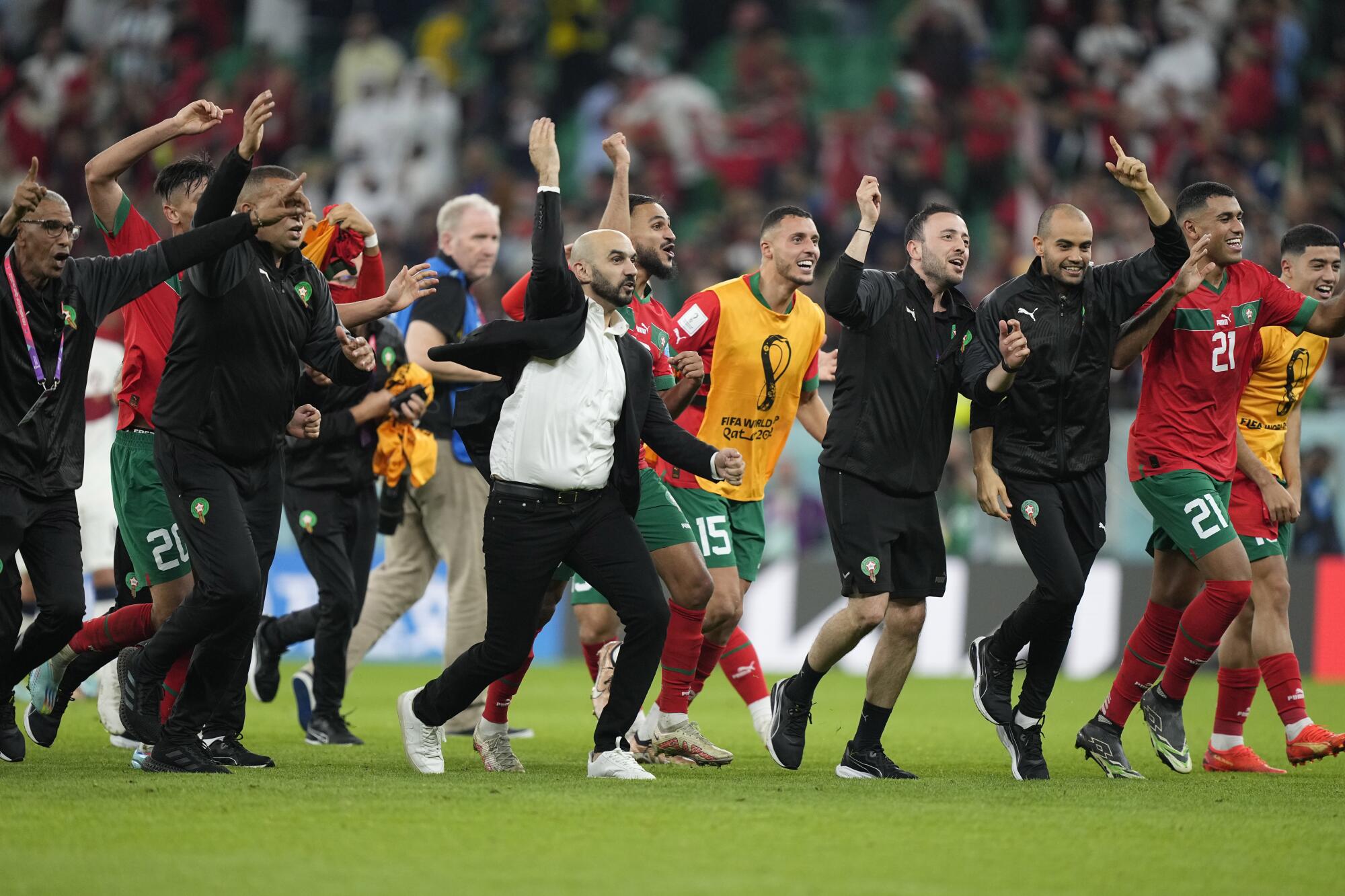
That’s why Morocco’s 13 shots on goal and five scores are the fewest of any of the four semifinalists — yet it’s also why Morocco is one of only two unbeaten teams left in Qatar.
French coach Didier Deschamps, who won the World Cup four years ago and must get past Morocco to return to the final, said his opponents’ success is no fluke.
“Morocco deserves everyone’s recognition,” he said. “When you face the teams they have met, had their results and conceded only one goal in five games, you can no longer say that it’s a surprise.
“They deserve to be there.”
Regragui has embraced his team’s longshot status by comparing it to the ultimate underdog.
Grant Wahl lifted, popularized and pioneered soccer coverage in the U.S. Above all, he shared that giant, adventurous life with colleagues and strangers alike.
“We are the Rocky of this World Cup,” he said. “When you watch ‘Rocky,’ you want to support Rocky Balboa. Now the world is with Morocco.
“We have made our people and our continent so happy and proud.”
In the original movie, Rocky lost a split decision to Apollo Creed — who, like France, was the reigning champion. After his team’s win over Portugal, Regragui said there’s no reason to believe Morocco can’t write a new ending to the story.
“Why shouldn’t we dream about winning the World Cup?” he said. “It doesn’t cost you anything to have dreams.”
Staff writer Nabih Bulos reported from Jeddah, Saudi Arabia, and contributed to this story.
More to Read
Go beyond the scoreboard
Get the latest on L.A.'s teams in the daily Sports Report newsletter.
You may occasionally receive promotional content from the Los Angeles Times.

